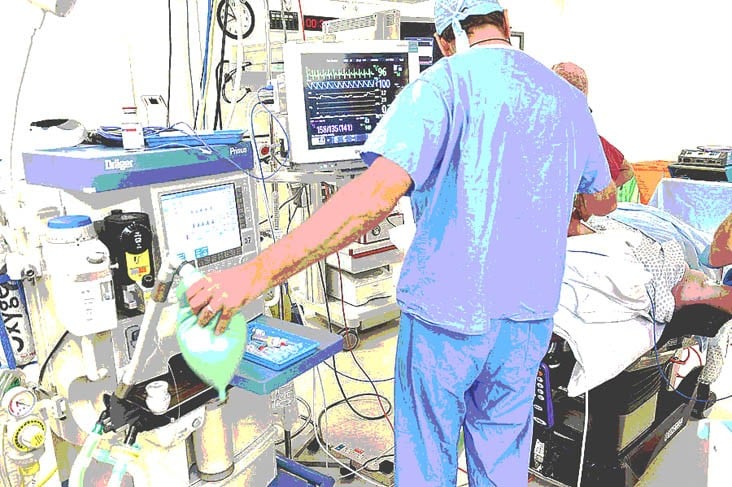
There is a shortage of qualified anaesthetists at public hospitals in and around Lahore. How will the health department meet the crisis?

Anaesthesiology is one of the most important departments of any hospital. Anaesthesiologists, or anaethetists, are concerned with the total care of patients before, during, and post surgery. They are considered a vital member of any surgical team. Besides, they manage the intensive care units (ICUs) at a hospital.
Presently, about 2,800 qualified anaesthetists are registered with the Pakistan Medical & Dental Council (PMDC). Yet, there is a severe shortage in public hospitals. At least 305, out of the 408 posts for anaesthetists at the District Headquarter Hospitals (DHHs) and Tehsil Headquarter Hospitals (THHs) in Punjab, are reported to be lying vacant. The DHHs and THHs of Lahore and adjacent cities are also running short of anaesthetists.
It’s being seen as a global phenomenon. Countries like the USA, UK, India, and many others have reported shortage of anaesthetists, and are struggling to overcome this.
One reason for the crisis is the involvement of anaesthetists in multiple areas of care. The World Health Organization (WHO) and the World Bank say that by 2026, the burden of diseases requiring surgery and anaesthesia shall far exceed that of HIV, tuberculosis, and malaria. Correspondingly, the demand for qualified anaesthetists shall increase.
Prof Khalid Bashir, President of Pakistan Society of Anaesthesiologists (PSA), says a number of factors are responsible for the current situation. For instance, there is a small number of training slots, an even smaller number of trainers, increasing surgical disciplines, transfer of trainers to new medical colleges, difficulty in procuring jobs after qualifying, the stress of doing a specialty, working hours in the DHHs/THHs, retention of trained staff, and finances.
"There’s an imbalance between the supply [of anaesthetists] and demand," he says, talking to TNS. "Anaesthetists are absolutely necessary for the delivery of multiple hospital services, and a shortage in this speciality presents a serious risk to patients’ life.
"The department of anaesthesiology is to a hospital what pillars are to a building; the stronger the pillars, the safer the building. Unfortunately, this fact is still not fully recognised in Pakistan," he says, lamentingly.
About 12 years ago, the Punjab government started incentivising doctors working in the department. This took a beating due to the rising inflation in the following years.
Dr Yousaf, an anaesthetist, and Vice President of Young Doctors’ Association (YDA), Pakistan, considers two factors need to be addressed immediately. Firstly, he says, professional doctors are not interested in becoming anaesthetists, and secondly, wrong methods of training are being imparted to technicians to fill the vacancies at the DHHs and THHs.
"The government must introduce an attractive package to increase the number of experts in such a seminal department," he adds. "Also, the technicians under training are not being trained to tackle the patients coming in to a DHH or THH. They are being trained to tackle neurological surgeries, different kinds of kids’ surgeries, and plastic surgeries etc., which have nothing to do with the expert working at the facilities."
The previous government took certain steps to meet the growing demand of anaesthetists. The current regime in Punjab is also trying to deal with the issue on priority basis. Punjab Health Minister Dr Yasmin Rashid has instructed the health department to fill the vacant seats as early as possible. On top of that, the health department has approved a special allowance ranging between Rs125,000-300,000 in different, categorised areas. For every surgery, an anaesthetist would be paid an extra Rs1,000.
"A proposal of increase in the special allowance, up to Rs500,000, has been submitted to the department," says Waseem Butt, the spokesperson for Health Department, Punjab. "Besides, travel allowance shall be offered to those having to travel for surgeries."
The spokesperson further says that the health department shall train technicians by offering them a two-year-diploma in Anaesthesiology. Additionally, they will be recognised as consultants.
"The current lot of 48 diploma holders is ready to be posted in different DHHs and THHs."
Prof Khalid Bashir appreciates the efforts but is not happy about the department taking PSA Lahore onboard, "There is a need to improve the facilities of the existing health professionals. Besides, training programmes should be introduced. There should be a close collaboration among anaesthetists, postgraduate institutions, and health authorities to ensure the recruitment of trainees, quality training, and supervision.
"The anaesthetists are solely responsible for the safety of patients during the operation," he adds. "Their job is technical and needs training under supervision. It takes two years to train a doctor for a diploma so that he can administer safe anaesthesia. It is not justified to send untrained doctors and technicians to perform the highly sensitive and skilled job on poor patients at the DHHs and THHs."
According to Dr Yousaf, the government’s efforts to train the technicians provide "a temporary solution." Also, "you cannot compare with a professional who has a postgraduate degree in the discipline. Graduates take exam for the Fellowship of the College of Physicians and Surgeons (FCPS), a postgraduate qualification, in the field which consumes at least four years of their lives. Putting a two-year diploma holder and an FCPS in the same bracket is totally unfair."